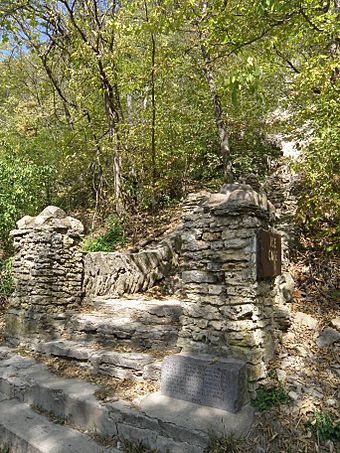Decorah Ice Cave State Preserve facts for kids
Quick facts for kids |
|
|
Decorah Ice Cave
|
|
 |
|
| Location | Ice Cave Rd. Decorah, Iowa |
|---|---|
| Area | 2.9 acres (1.2 ha) |
| Built | 1898 |
| NRHP reference No. | 78001269 |
| Added to NRHP | December 20, 1978 |
The Decorah Ice Cave State Preserve is home to one of the biggest ice caves in the Midwestern United States. It's a special place covering about 3 acres of land. You can find it at the edge of Barbara Barnhart VanPeenen Memorial Park. This park is in the northern part of Decorah, which is in Winneshiek County, Iowa.
Contents
What is the Decorah Ice Cave?
The Decorah Ice Cave is a unique natural wonder. It's a type of cave called a glacière, which means "ice cave" in French. These caves are special because they can hold ice even when it's warm outside.
How Ice Forms in the Cave
The cave stays dry from autumn until early winter. Then, in January or February, ice starts to form. It appears near the entrance and goes deeper into the cave. By late May, you can often see several inches of ice on the north wall. This ice usually stays until late August. It's like a natural refrigerator!
Karst Topography and the Cave
The Decorah Ice Cave is part of a special type of landscape. This landscape is called karst topography. Karst areas have features like sinkholes and cave systems. All these features are found around the Decorah Ice Cave. This area is also part of Iowa's Driftless Area. The Driftless Area is unique because glaciers did not flatten it.
Visiting the Ice Cave
The Ice Cave is open for people to visit. However, visitors need to be careful. In the late 1990s, a barrier was put in place. This was because some rocks inside the cave were moving. Later, a larger rock fell. Now, visitors can only walk about 10 feet into the cave. This is to keep everyone safe.
History of the Ice Cave
The city of Decorah received the cave in 1954. It still belongs to the city today. In 1973, it was named a state geological preserve. This means it's protected for its unique natural features. Later, in 1978, it was added to the National Register of Historic Places. This list includes important historical places across the United States.
 | Charles R. Drew |
 | Benjamin Banneker |
 | Jane C. Wright |
 | Roger Arliner Young |



